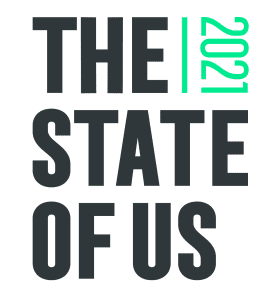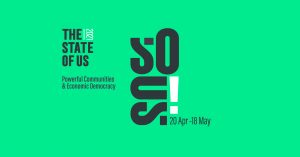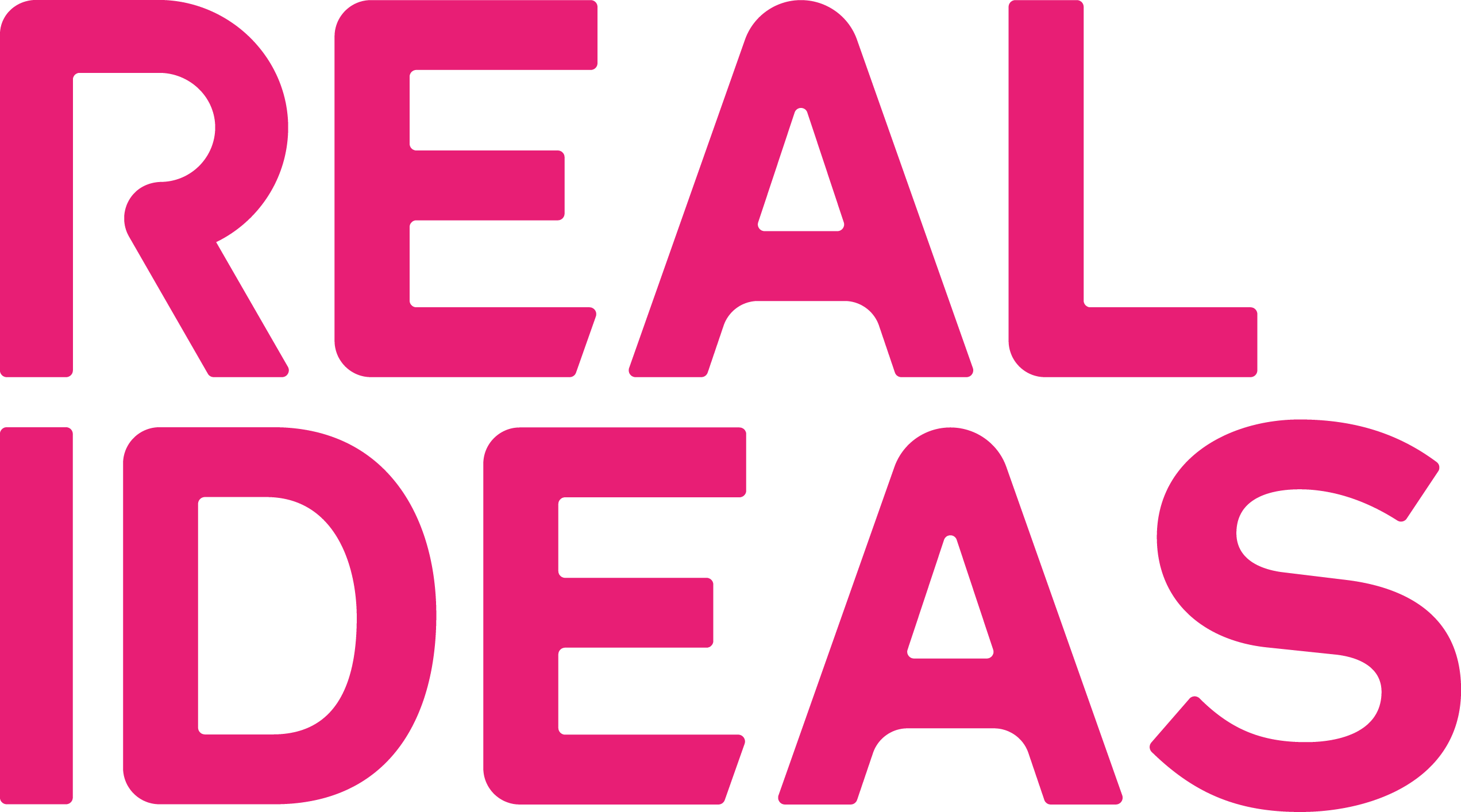
The State of Us, based out of Plymouth (UK), drew inspiration from new municipalist movements across the world. Over a series of three events in April and May 2021 featuring grassroots, national and international speakers, we explored how people are building power and economic democracy in different contexts: our work, in our public spaces and in environmental action. In the fourth and final session, we asked what is next for The State of Us.
Throughout history, people and communities have strived, fought, and sacrificed for self-determination; for enough freedom, power, and choice to meet their needs and create meaningful futures.
Recent events have demonstrated that citizens need agency and control, and when they gain this, they in turn create wider, more comprehensive benefits for society.
We need to revitalise our high streets, the public realm, and green spaces. We want better health and well-being, have more productive and meaningful work, to protect our democracy, navigate a looming climate disaster, and to meet our basic needs. To do this, we need active citizens and robust communities.
Though while we seek to create Empowering Places, the pillars of power are increasingly being pulled from us. Constant attack erodes democracy, corporate interests dominate the digital space and mass media, and Covid-19 has not just exposed societies’ stark inequalities but has amplified and accelerated them.
Agency to determine our futures is an equality issue. The economic system is skewed, favouring and giving vast power to a small elite – almost a quarter of the UK’s domestic wealth now reportedly owned by the wealthiest 1% – while citizens and communities are becoming generationally more impoverished and increasingly powerless.
At the same time, there are cities, like Plymouth, that have vibrant social economies. As the UK’s first “Social Enterprise City”, Plymouth has some 200 social enterprises, coops and community businesses, a pioneering Cooperative Council and is one of Power to Change’s Empowering Places. Though with the impact of Covid-19 ongoing and inequalities intensifying; Brexit a reality and hard-won rights under threat; and the effects of climate change increasingly being felt – this does not seem enough.
The State of Us is brought to you by: Real Ideas, New Economics Foundation (NEF), Power to Change, Co-operatives UK, Centre for Local Economic Strategies (CLES), Plymouth Social Enterprise Network (PSEN), Stonehouse Voice (SHV).
The State of Us is for anyone working on social, environmental, racial, and economic justice, democracy and power at a local level across the UK, whether through local enterprise, community organising, activism, third sector, or local government.
New ways of building powerful communities and economic democracy are emerging worldwide. Local enterprises and activists are building new municipal models, alternative forms of power to advance and expand a more democratic regenerative economy in cities such as Jackson (MS), Cleveland, and Barcelona. More recently, mutual aid groups, the Black Lives Matter movement, and new unions are making fresh demands of the state.
Building on a foundation of self-managing enterprise, how can places like Plymouth further foster social, environmental and community resilience? How can we build powerful communities and a more democratic economy? What is The State of Us?

Over three initial focus sessions and a final plenary, The State of Us examined critical areas of the economy where citizens are practically building power and ownership: Work, Spaces and Places, and Resilience (Making and Production). Each session brought together local, national, and international leaders and activist practitioners to present their case studies linked to the session theme, exploring different approaches and grassroots examples of how communities build power. Working with our partners and compiled by Stonehouse Voice, a full event summary and report has been created to capture the themes and stories presented across all four events of the conference.
You can read the full report now!
Events Programme Content and Recordings
Each event explored a specific theme and featured talks delivered by speakers from various local, national, and international grassroots groups. Below is a brief summary of each session topic, information about our speakers, and links to recordings.
THE STATE OF WORK
Watch the full event recording
The concept of livelihoods is one to revisit as work becomes more precarious and the workforce more fragmented. The State of Work explored the changing nature of work and showed the solutions forged through new business models and enterprises, collective organising and localised support for the self-employed.
Speakers and individual recordings:
- Lindsey Hall, Real Ideas.
- Henry Lopez, IWGB (Independent Workers of Great Britain).
- Emily Scurrah, NEF (New Economics Foundation).
- Dorothy Francis, CASE (Co-operative and Social Enterprise Development Agency).
THE STATE OF PLACES & SPACES
Watch the full event recording
The unequal distribution of ownership and access to land and property is one of the critical areas of structural inequality and exploitation in the UK. With a particular focus on local, migrant and worker-owned businesses, The State of Places and Spaces explored how citizen-led community and social enterprise counter this and the role local institutions can play as partners.
Speakers and individual recordings:
- Hannah Sloggett, Nudge Community Builders.
- Nirushan Sudarsan, Butetown Matters.
- Vicky Alvarez, Latin Village.
- Jacqueline Slade, Stiltskin Arts & Theatre Co.
THE STATE OF RESILIENCE (MAKING & PRODUCTION)
Watch the full event recording
Often, environmental sustainability is side-lined for the illusion of economic growth, or set-in conflict with more social outcomes and visa-versa. False choices as climate and ecological emergencies intensify. The State of Resilience explored how we can ensure sustainability is at the heart of the struggle for autonomy and how community enterprises and initiatives are making this happen.
Speakers and individual recordings:
- Tomas Diez, FabLab Barcelona/FabCity Network.
- Mona Bani, May Project Gardens.
- Hannah Harris, Plymouth Culture/Fab City Plymouth.
- Jane Hembrow & Susan Moores, Plymouth Scrap Store CIC.
THE STATE OF US: PLENARY
Watch the full event recording
With contribution from municipalist speakers, the final plenary session brought together the experience of more developed new-municipal movements with learning from the earlier session – growing, summarizing and consolidating collective learning to identify new areas of activity, new groups, collaborations and networks and initiate practical next step actions to widen community power and economic democracy.
Speakers and individual recordings:
- Matthew Thompson, Liverpool University (UK).
- Elena Tarifa, Barcelona en Comú (Catalonia).
- Thobile Chittenden, Makers Valley Partnership (Johannesburg, South Africa).
- Kali Akuno, Cooperation Jackson (MS, USA).
What Happened Next?
Influences on other work
The case studies, examples and stories shared by inspiring speakers have had a profound influence on our delivery of other projects and programmes, such as Empowering Places, Future Parks Accelerator, Green Minds, and Fab City Plymouth.
The opportunity to learn about different ways of building local-level power, community organising, and collaboration between differing groups has opened doors to strengthening our practices around these values. We are actively seeking out opportunities to network and partner with other organisations, using our platforms to highlight and contribute towards grassroots activity.
Other Media
Badge Nation
From early on in planning this conference we felt it was important to recognise engagement with the topics and reward people’s time, commitment and knowledge in attending and contributing to the sessions. A collection of three digital badge templates was created to recognise various levels of engagement such as organising and attendance, highlighting skills like activism, collaboration, awareness and resilience.
During the Plenary event, a short talk was given on digital badges as a fantastic tool for communities to take control of their own learning. At the end of the conference, The State of Us badges were issued a total of 108 times and accepted by attendees, organisers, and speakers across the globe.
Find out more about digital badges on the Badge Nation Website or YouTube channel.
What Now for The State of Us?
Get involved and be in the know
Be the first to find out about future events, connect with others, and grab hold of learning opportunities.
Real Ideas membership:
Starting from absolutely free, membership with Real Ideas will get you news, updates, tangible opportunities, and priority invites and discounts for experiences, workshops and events online and face to face, with paid membership offering access to personalised business support and campus of spaces.
Plymouth Social Enterprise Network:
PSEN represents all kinds of social enterprises including co-operatives, community interest companies, charities, community businesses and more. All are joined by a common bond – that of doing business for a good cause.
Fab City Plymouth:
In 2019 Plymouth became the first UK city to successfully join the global Fab City network – a network of 34 cities worldwide committed to producing nearly everything they consume by 2054. Join communities from across the city to find out more and help shape what this can mean for Plymouth.
Stir to Action:
Building a new economy based on democratic ownership through training programmes, strategic economic development, and a quarterly magazine – Stir to Action have a wide range of resources and learning opportunities available such as this article from The State of Us 2021 speaker, Matthew Thompson: Re-producing Space for Community Wealth Building.

